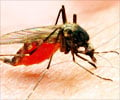People affected with West Nile Virus (WNV) have neurological complications. Brain damage occurs even after years of original infection.

‘Regular assessment of people with West Nile virus can help detect early signs of neurological deficits.’





The 10-year study from researchers at Baylor College of Medicine in Houston is one of the largest assessments to date tracking neurological deficits in West Nile virus victims and the first to link neurological problems associated with the disease, like muscle and memory impairments and tremors, to physical evidence of brain damage as seen via magnetic resonance imaging (MRI)."Our findings add to a growing amount of evidence that West Nile virus is a serious health threat that deserves considerably more attention because there still are no drugs available to treat it and no vaccines to prevent it," said Kristy Murray, DVM, PhD, of Baylor's National School of Tropical Medicine and the lead author of the study.
West Nile virus is a mosquito-borne disease originally confined to East Africa that did not emerge in North America until 2000. It is now found in every state except Hawaii and Alaska and maintains a consistent presence because it infects both birds and humans. Experts believe up to 3 million people in the U.S. have been exposed to the disease.
The U.S. Centers for Disease Control and Prevention (CDC) has documented more than 2,000 deaths from West Nile. But previous research by Murray and her colleagues suggests the death rate may be much higher. It found evidence that many people infected with West Nile die years later -- yet far earlier than had they not been infected.
The current study, presented at the ASTMH meeting by co-author Shannon Ronca, PhD, MPH, emerged from a 10-year effort--from 2002 to 2012 to track 262 people in the Houston, Texas region with a history of West Nile virus to look for evidence of long-term health problems.
Advertisement
The most common physical problems involved muscle weakness, abnormal reflexes and tremors. Several subjects showed signs of cognitive impairments as well, mainly problems with short- or long-term memory beyond what would be expected from normal age-related cognitive decline.
Advertisement
The scientists also found that people whose initial infection had progressed to West Nile virus neuroinvasive disease, which can produce swelling in the brain, showed signs of degeneration or atrophy in several regions. They included the cerebellum, where damage can affect movement and balance, and the brain stem, which links the brain to a range of bodily functions, including breathing, speech and sleep cycles. In addition, atrophy was observed in the thalamus, where damage can lead to tremors and problems with reflexes.
"The issues we are seeing on the MRIs are consistent with what would occur from an infection that caused a lot of inflammation in the brain," Murray said. "Inflammation can lead to scarring as the brain starts to heal, and that scarring can cause damage."
Moreover, evidence of neurological disorders and brain injury was found across the spectrum of West Nile virus infections. They were seen not just in those who had experienced neuroinvasive disease, but also in people who reported only mild symptoms.
Of the 57 people diagnosed with neurological deficits, seven had never noticed any symptoms at all. Their infection was detected during a routine screening test for blood donors.
At the ASTMH conference, Ronca said the new evidence from the brain scans should prompt greater attention to the fact that any West Nile virus infection has the potential to cause long-term neurological problems.
"It will be important to regularly assess people who have been infected with West Nile virus for early signs of neurological deficits and brain MRIs should be considered when symptoms are observed," Ronca said.
"It's critical for our scientists to keep following the outcomes for patients who have suffered a West Nile virus infection so that we have a full picture of the dangers posed by this disease," said Patricia F. Walker, MD, DTM&H, FASTMH.
"The risks they are uncovering highlight the need to intensify prevention efforts, from mosquito control to developing a protective vaccine."
Source-Eurekalert














